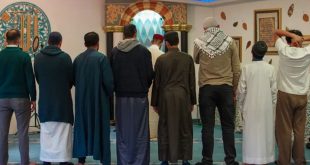I remember once a group of people attacked Jews’ houses, plundered some of their goods, robbed women’s bracelets and bothered them a lot. There were many people shouting and screaming. He (Shaykh Mohammad Hadi Jalili) ordered the plunderers to bring back whatever they had taken to the mosque so that he would give them back to their owners. When all the goods were gathered, he ordered everyone to leave the mosque. Then he sent for the Jews and when they came, he gave them whatever they had lost.
The behavior of the great Shiite scholars towards the adherents of other religions is mentioned in a piece of writing by the researcher of oral history, Hamid Qazvini. Here is part of his writing:
“On Wednesday, November 28,2018,I attended a meeting hosted by Sayyid Mohammed Javad Alavi Borujerdi. It was held in Qom concerning ‘Imam Musa Sadr and universal mission of the cleric community’.
Mr. Alavi Borujerdi is the grandson of Ayatollah Sayyid Hussain Borujerdi, the grand Marja`of Shia. Now he is in charge of the Great Mosque and library of his grandfather. In his speech, in addition to emphasizing the importance of having constructive interaction and relationship among Shiite scholars, the adherents of other divine religions and Islamic schools, he pointed out that profiting from Imam Mousa Sadr’s model is a necessity in this regard.
Recounting a reminiscence of his grandfather, this high-ranking lecturer of seminary said:
“In the past some Jewish families were living in Borujerd. Grand Ayatollah Borujerdi was still living in that city then. Unfortunately, some children who were under the influence of their parents, were insulting the Jews and were throwing stone at them in their funeral ceremonies. Ayatollah Borujerdi preached different sermons and tried to persuade people not to do so, but it did not work. Inevitably, he himself decided to accompany the Jews in their funeral ceremonies so that people would avoid behaving like that out of respect to Ayatollah Borujerdi. Gradually, by Ayatollah Borujerdi’s good planning, people totally changed that behavior.
This narration reminds me about a memory that Ayatollah Abdul Jalil Jalili Kermanshahi narrated about his father Ayatollah Shaykh Mohammad Hadi Jalili and I have reported it in details in ‘Sir Mousa and I’.
He said, “People of Kermanshah including Shias, Sunnis, even Jews and Christians believed in him and were gathered around him. I remember that in religious Eids, Jewish priests accompanied by a crowd of their followers, visited him to offer their congratulations. Even all the Jews had set up their houses around our mosque to be safe from the objections, considering that there were some people who used to bother the Jews.”
In the following, you read a memoir that is written in the ‘Sir Mousa and I’:
“I remember once a group of people attacked Jews’ houses, plundered some of their goods, robbed women’s bracelets and bothered them a lot. There were many people shouting and screaming. He (Shaykh Mohammad Hadi Jalili) ordered the plunderers to bring back whatever they had taken to the mosque so that he would give them back to their owners. When all the goods were gathered, he ordered everyone to leave the mosque. Then he sent for the Jews and when they came, he gave them whatever they had lost. It was in a way that one of their elders were saying, “Shaykh Hadi is even better than Moses himself.” They believed in him like this. When my late father meets his demise, these Jews arranged a funeral for him.
‘Sir Mousa and I’ is the first book of the oral history of the Institute of Imam Mousa Sadr`s collection about the reminiscences of Ayatollah Abdul Jalil Jalili Kermanshahi who was a close friend of Imam Mousa Sadr during his years in seminary and university.
There are some information in this book about the father of Imam Mousa Sadr, his professors and friends, his seminarian days and the city of Qom during his youth that provides the reader with a clear insight into Imam Musa Sadr`s seminarian days from his youth to his migrating to Lebanon.
This photo is taken of late Ayatollah Abdul Jalil Jalili Kermanshahi, receiving a visit from the Oral history group of the institute of Imam Mousa Sadr.
 Ijtihad Network Being Wise and Faithful Muslim in the Contemporary World
Ijtihad Network Being Wise and Faithful Muslim in the Contemporary World
